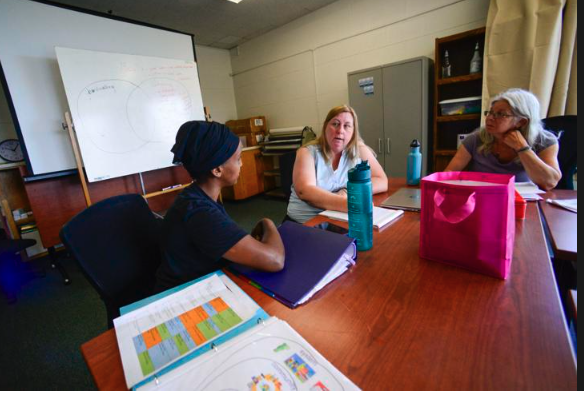
New Americans Receive Childcare Work Training
Photos by Kris Radder
Article by Chris Mays
Original article, video and photo essay at https://www.reformer.com/local-news/new-americans-receive-child-care-work-training/article_2d37359e-20bc-11ee-924b-936e3d8fbcd5.html
BRATTLEBORO — Several groups collaborated to provide new Americans with an opportunity to be trained to enter the child care field.
“I think the whole lack of child care, the affordability of child care isn’t new,” said Alex Beck, manager of the Welcoming Communities program at Brattleboro Development Credit Corp. “There’s lots of discussions around that.”
Windham County would need 129 teachers based on additional slots needed to meet demand, according to a 2022 report by Let’s Grow Kids.
BDCC staff heard of a grant available through the child care advocacy organization Building Bright Futures, then funding came through to host training specifically for new Americans in the region. Community College of Vermont provides the training, with the first offering particularly focused on training refugee women living locally right now.
The project also involved Vermont Adult Learning and World Leaning, which provided intensive English classes targeted to the training.
“We developed a culturally responsive pathway into the early childhood education field that met the needs of the students and providers in the region,” Graff said. “The project is in direct response to early childhood workforce development, with a specific focus on racial and ethnic diversity and meeting the needs of New Americans in the workforce and how they can successfully access career pathway training and experience.”
Beck said his group has heard that English is “the biggest barrier to success for refugee women in the field.”
“Most of them are mothers so they are capable child care providers,” he said. “But language is the biggest barrier.”
Building Bright Futures helped support the design of the six-week pre-training English classes. A total of 16 women signed up.
“Some of them have never been in the classroom before,” Beck said. “Some of them, their literacy even in their own language was limited. It was a great experience. We provided stipends to the ones who attended and basic child care ourselves.”
Eight of the 16 women have moved on to the full training through CCV, which is scheduled one day a week at Winston Prouty Center for Child and Family Development. Vermont Adult Learning offers tutoring and catch-up sessions on another day to help ensure students don’t fall behind.
Beck estimates the class will conclude in 12 sessions.
“We’ll see how long it takes to get through all the material,” he said. “It’s flexible. We built in a lot of extra time if people need to redo a class.”
One goal is to make sure the students are ready to enter the workforce. Another is to “really understand” how to conduct the training then expand it to other fields such as health care and manufacturing, Beck said.
“The structure is what makes it unique and interesting,” he said.
The Vermont Department of Labor is helping to offset expenses, as the training costs more than the grant secured. Vermont Southeast Transit has been supportive in assisting students get to the classes.
Beck hopes similar training can be offered more regularly and delivered with various partners. He said it’s exciting to see adults in new learning environments, coming from places where women didn’t have access to education at all.
“In Vermont,” he said, “getting workers and job seekers to show up to a training has been a barrier.”
Beck said some of the students have only been in the U.S. for a little longer than a year, and one has been here for two months before enrolling. He pointed out that having the classes at the Winston Prouty Center allows students a first-hand glimpse at the environment in which they will be working.
Established in 2018 and initiated by Winston Prouty Center Executive Director Chloe Learey, the Child Care Counts Coalition is dedicating to stabilizing and increasing the number of available slots for high quality child care in Windham County. Recognizing that access to child care is a critical economic and workforce development issue, the group seeks to engage with a broad range of partners invested in the issue.
“Understanding that local providers could open additional classrooms if they could hire more staff, we knew that if we could add just a few more members to the workforce, the pilot would be a success,” Graff said. “Our goal was to train at least four New Americans into the workforce and we’re on track to meet or exceed that goal.”



